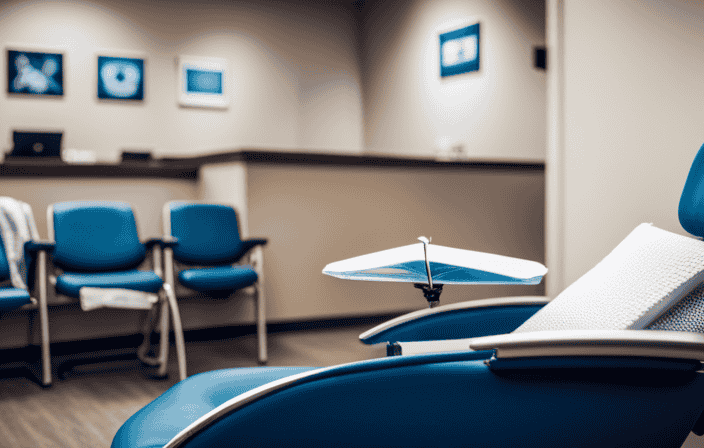Before the break of dawn, while the globe is in slumber, a student lies awake, their mind buzzing with the anticipation of upcoming university exams. This period is marked by tension, worry, and strain, yet it also presents an opportunity to demonstrate one’s capabilities and attain achievement.
In this guide, we will explore the powerful connection between sleep, nutrition, and academic performance. By understanding the importance of restful sleep, fueling our bodies with wholesome foods, and implementing practical strategies, we can conquer exams with clarity, focus, and the confidence to thrive.
Key Takeaways
- Getting enough sleep is crucial for repairing processes in the body and improving test performance.
- Creating a sleep-friendly environment by sleeping in a dark and quiet space, using a sleep mask, and eliminating distractions can promote better sleep.
- Consuming a light, protein-rich snack before sleep, such as low-fat milk or yogurt, can aid in falling asleep.
- Planning ahead, organizing tasks, and following a set schedule can reduce stress, improve efficiency, and promote better sleep.
Preparing for Exams
I need to plan ahead and prioritize my tasks in order to effectively manage my time and prepare for exams. Research has shown that having a clear plan for the next day’s tasks promotes better sleep and reduces stress.
By organizing and prioritizing my tasks, I can improve my time management skills and ensure that I am using my study time efficiently. Breaking down my study materials into smaller, manageable chunks will also help increase my productivity and focus.
Additionally, making a to-do list before bed can help reduce worry and anxiety, allowing me to relax and get a good night’s sleep. By following these strategies, I can create a solid foundation for success during my university exams.
Importance of Sleep
Prioritizing sufficient rest is crucial for optimizing academic performance and cognitive function during the intense demands of university exams. Sleep plays a vital role in memory consolidation and test performance, so it’s important to establish a regular sleep schedule. Creating a sleep-friendly environment can enhance the quality of your sleep, such as sleeping in a dark and quiet space or using a sleep mask. Snacking before sleep can aid in falling asleep, but it’s important to choose light, protein-rich snacks like low-fat milk or yogurt. Planning ahead and organizing tasks can alleviate stress and improve productivity. Effective time management allows for a balanced schedule and reduces the need for late-night studying. Lastly, maintaining a healthy diet, packing nutritious meals, eating a healthy breakfast, and staying hydrated are all essential for overall well-being and academic success during exams.
| Tips for Better Sleep | Benefits of Planning Ahead | Importance of Time Management | Benefits of a Healthy Diet |
|---|---|---|---|
| Sleep in a dark, quiet space | Reduce worry and anxiety | Improve efficiency | Support overall health |
| Use a sleep mask | Promote better sleep | Reduce stress | Brain function |
| Create a comfortable sleep environment | Improve time management | Improve well-being | Healthy food choices |
| Eliminate distractions in the bedroom | Alleviate stress | Aid in meeting deadlines | Varied diet |
| Invest in blackout curtains or earplugs | Improve productivity | Achieving goals |
Creating a Sleep-friendly Environment
Creating a sleep-friendly environment involves ensuring that the bedroom is dark and quiet, using a sleep mask if necessary, and eliminating any distractions that may disrupt sleep. Here are three tips to create the perfect sleep environment:
-
Invest in blackout curtains or blinds to block out any outside light. Darkness promotes the release of melatonin, the hormone that regulates sleep.
-
Use earplugs or a white noise machine to drown out any noise that may disturb your sleep. Silence or soothing sounds can help you relax and fall asleep faster.
-
Keep your bedroom free from electronic devices, such as phones or tablets, which emit blue light that can interfere with your sleep. Create a technology-free zone to promote a restful sleep.
By implementing these strategies, you can create a peaceful and sleep-inducing environment that will help you get the restful sleep you need during university exams.
Snacking Before Sleep
To enhance my sleep quality, I often enjoy a light, protein-rich snack before bed. Consuming foods like low-fat milk or yogurt can promote better sleep. These protein-rich snacks provide the body with the necessary amino acids to support the production of sleep-inducing hormones, such as serotonin and melatonin.
Avoiding heavy meals close to bedtime is recommended as they can cause discomfort and disrupt sleep. By choosing healthy snacks, I am not only promoting better sleep but also contributing to my overall well-being.
It is important to find the right balance between hunger and sleep, as going to bed hungry can also interfere with falling asleep. By incorporating a light, protein-rich snack into my routine, I am taking a practical step towards improving my sleep quality during university exams.
Planning Ahead
When I make a to-do list before bed, I find that I am able to reduce worry and anxiety, which helps me sleep better and wake up feeling more organized and prepared for the day ahead. Planning ahead is an essential strategy for success during university exams. Here are three key reasons why planning ahead is important:
-
Reducing Stress: By organizing and prioritizing tasks, you can alleviate stress and create a sense of control over your workload. Knowing what needs to be done allows you to tackle each task methodically, reducing the feeling of being overwhelmed.
-
Improved Time Management: Planning ahead helps you make the most of your time. By breaking tasks into smaller, manageable chunks, you can increase productivity and efficiency. Following a set schedule also reduces the need for late-night work, allowing for better sleep and overall well-being.
-
Enhanced Productivity: Having a plan for the next day’s tasks allows you to hit the ground running. By reminding yourself of your plan, you can start your day with focus and purpose, maximizing your productivity and achieving your goals.
By incorporating the practice of planning ahead into your routine, you can reduce stress, manage your time effectively, and increase your productivity during university exams.
Time Management
I prioritize tasks and follow a set schedule to effectively manage my time. Planning and scheduling tasks in advance has been crucial in improving my efficiency and reducing stress during university exams.
Breaking down tasks into smaller, manageable chunks has allowed me to be more productive and meet deadlines. By organizing and prioritizing my tasks, I can allocate the appropriate amount of time for each one, ensuring that I am not overwhelmed with last-minute work.
This approach has also reduced the need for late-night studying, allowing me to get enough sleep and maintain a healthy balance between work and rest. Effective time management has not only improved my academic performance but also my overall well-being during the exam period.
Importance of a Healthy Diet
Now that we’ve discussed the importance of effective time management during university exams, let’s shift our focus to another crucial aspect of thriving during this challenging period: maintaining a healthy diet.
A nutritious diet plays a vital role in supporting our overall well-being and academic performance. Opting for nutritious foods, such as fruits, vegetables, and whole grains, provides essential nutrients for optimal brain function. On the other hand, avoiding junk food and sugary drinks can help us stay focused and energized while studying.
Planning meals ahead of time ensures that we make healthier food choices and reduces our reliance on vending machines. By including a balance of protein, fats, and carbohydrates in our snacks, we can sustain our energy levels throughout the day.
Prioritizing homemade meals over fast food contributes to better health and provides us with the nutrients we need to succeed during exams. Remember, a healthy diet is a key ingredient in our recipe for success.
Packing Healthy Meals
Packing a balanced lunch and snacks ensures that I have nutritious options to fuel my body and brain during intense study sessions. It’s important to prioritize homemade meals over fast food, as they contribute to better health. By preparing meals in advance, I save time and promote healthier eating habits. When packing my meals, I aim for a combination of protein, fats, and carbohydrates to provide sustained energy throughout the day. I also make sure to include a variety of fruits, vegetables, and whole grains for essential nutrients. To add depth and complexity to my meals, I use a 2 column and 5 row table to plan my lunch and snack options. This helps me stay organized and make healthier choices. Overall, packing healthy meals is a practical and research-based approach to supporting my well-being during university exams.
| Lunch Options | Snack Options |
|---|---|
| Grilled chicken wrap | Greek yogurt with fruit |
| Quinoa salad with veggies | Mixed nuts |
| Veggie stir-fry | Hummus and vegetables |
| Turkey and avocado sandwich | Hard-boiled eggs |
| Salmon and brown rice | Fresh fruit |
Importance of Breakfast
To ensure optimal energy and focus throughout the day, starting my mornings with a nutritious breakfast is essential. Research has shown that eating a healthy breakfast boosts cognitive function and concentration, setting a positive tone for the day ahead.
Here are five reasons why breakfast is important during university exams:
-
Enhanced brain function: Including protein, whole grains, and fruits in breakfast provides essential nutrients that support brain function and improve memory and concentration.
-
Sustained energy: A balanced breakfast with carbohydrates, protein, and healthy fats provides a steady release of energy, keeping me fueled throughout the morning.
-
Improved mood and motivation: Eating a nutritious breakfast can improve mood, reduce stress, and increase motivation, helping me stay focused and productive during exams.
-
Better decision-making: Breakfast helps regulate blood sugar levels, which can enhance decision-making skills and problem-solving abilities.
-
Healthy habits: Making time for breakfast establishes a healthy routine and encourages me to make better food choices throughout the day.
By prioritizing breakfast, I can optimize my performance and increase my chances of success during university exams.
Staying Hydrated
Staying hydrated is crucial for maintaining focus and energy levels throughout the day. Drinking water throughout the day aids in cognitive function and helps to avoid dehydration, which can negatively impact academic performance.
It is important to avoid sugary drinks and instead make water the primary beverage choice during exams. Carrying a reusable water bottle is a practical way to promote hydration and sustainability.
By staying hydrated, you are supporting your overall well-being and academic success. Make it a habit to drink water regularly, even when you don’t feel thirsty. Plan ahead and pack a water bottle with you wherever you go.
Remember, staying hydrated is a simple yet effective way to optimize your performance during university exams.
Maintaining Mental Well-being
Planning and organizing my daily tasks helps me maintain a positive mindset and prioritize self-care during the stressful exam period. It is important to take care of our mental well-being, as it directly impacts our ability to focus, retain information, and perform well academically. Here are some strategies I use to stay mentally well during exams:
| Strategies | Benefits |
|---|---|
| Practicing mindfulness and deep breathing exercises | Reduces stress and improves focus |
| Taking short breaks for relaxation and physical activity | Increases productivity and reduces mental fatigue |
| Seeking support from friends, family, or counselors | Provides emotional support and perspective |
| Engaging in hobbies or activities that bring joy and relaxation | Promotes overall well-being and reduces stress |
| Setting realistic goals and celebrating small achievements | Boosts motivation and self-confidence |
By incorporating these strategies into my daily routine, I am able to maintain a positive mindset, reduce stress, and perform at my best during university exams.
Frequently Asked Questions
How can exercise contribute to better sleep during exam season?
Regular exercise can contribute to better sleep during exam season by promoting relaxation, reducing stress and anxiety, and improving overall sleep quality. Engaging in physical activity helps regulate sleep-wake cycles and increases the production of sleep-promoting hormones.
What are some healthy and quick breakfast options for students with limited time?
Having a healthy breakfast is essential for students with limited time. One interesting statistic is that eating breakfast can improve concentration and memory by 20%. Quick options include yogurt with fruit, whole grain toast with peanut butter, or a smoothie with protein powder.
Are there any specific foods or drinks that should be avoided before bedtime to promote better sleep?
To promote better sleep, it is advisable to avoid consuming heavy meals and sugary drinks before bedtime. Instead, opt for light, protein-rich snacks like low-fat milk or yogurt, which can aid in falling asleep.
How can students manage stress and anxiety during exam season?
During exam season, managing stress and anxiety is essential. I find that taking deep breaths and practicing mindfulness techniques helps me stay calm. Additionally, staying organized and maintaining a balanced lifestyle are key to reducing stress.
What are some strategies for maintaining focus and concentration while studying for exams?
To maintain focus and concentration while studying for exams, I find it helpful to break tasks into smaller chunks, prioritize my time effectively, eliminate distractions, and take short breaks to refresh my mind.
Conclusion
In conclusion, prioritizing sleep, nutrition, and planning during university exams is essential for academic success.
While some may argue that sacrificing sleep and indulging in unhealthy snacks can lead to more time for studying, research shows that these habits actually hinder memory consolidation and test performance.
By creating a sleep-friendly environment, snacking wisely, and planning ahead, students can reduce stress, improve productivity, and enhance their overall well-being.
Remember, taking care of your physical and mental health is the key to thriving during exams. So, make sleep and nutrition a top priority, and watch your success soar.









